Martin Edwards's Blog, page 33
December 4, 2023
Sepulchre Street - paperback publication!
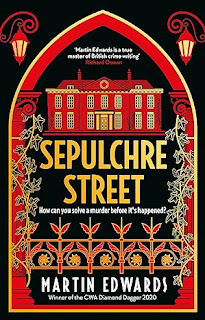
This week sees the publication - on Thursday, to be precise, of Sepulchre Street, the fourth novel in the Rachel Savernake series. You can buy it from your local bookshop or order it here on Amazon
I really enjoy writing Rachel's adventures - I'm having a whale of a time with book five, which I started recently: spoiler alert, in that one, Rachel goes to the seaside. In Sepulchre Street, there are key scenes on Romney Marsh, while the eponymous Sepulchre Street is to be found in the ancient and lovely town of Rye in East Sussex. And if American readers are wondering, the book will be published next year by Poisoned Pen Press (an imprint of Sourcebooks), under the title The House on Graveyard Lane. Different title, but same book!
And here are some of the reviews;
‘RachelSavernake is a 1930s feminist of independent means, who brings beauty andbrains to her mission to expose the seamier side of high society.
Her latestadventure finds her at a surrealist exhibition where the artist displays livemodels to re-enact violent deaths. The artist herself features as MarieAntoinette on the guillotine. A performance that turns horribly real when theblade falls.
The suicideverdict is beyond question, except that before the fatal act, the victim hadappealed to Rachel to unmask whoever had forced her to take her own life.
With astar-struck crime reporter in tow, Rachel embarks on a delightfully convolutedplot involving a glamourous courtesan with royal connections, a Soho gangsterbent on revenge and a hit man who leaves nothing to chance.
In treating usto what is as much a thriller as a traditional mystery, Edwards hits all theright notes to create a palpable hit.’
Barry Turner, Daily Mail
‘A fascinatingbook…Martin has done something rather magnificent here. If this was written as a pure thriller, it would be a deeply satisfyingbook, but woven throughout the thrills is a cleverly plotted mystery – with a cluefinderat the end to prove it. It’s worth reading, but I do warn the reader thatthey’ll end up repeatedly kicking themselves at the things that they missed…Allin all, this is an absolute triumph…The best book so far in an outstandingseries.’
In Search of the Classic Mystery Novel
‘I have a particular love of the golden age crime fiction and Sepulchre Street transports you backgloriously to the period, you can breathe in the setting, you get a real senseof time and location
For me Martin Edwards is the modern day master of the Golden Agecrime era and Sepulchre Street is theperfect example of why.
This is the fourth novel to feature Rachel Savernake andpossibly the best to date (it does though easily read as a standalone).
Here we have Rachel asked to solve a murder before it has evenhappened, but then has there even been a murder ?
The opening of the book is one of the most inventive I haveread, perfectly setting up what is to follow.
Martin Edwards poses many questions, with a wonderfullyinventive plot, the writing combines all that is good with the golden age butwith a modern day twist.
Theplotting is superbly thought out, constructed in a way that leaves a few cluesalong the way, though you may not always pick them up, the book is pacedperfectly for the period and just flows along. There are touches of the gothicwhich only heightens the reading enjoyment. In parts there is a conspiracytaking place with some definite unsavoury characters who act first then askquestions later, overall a slick and taut plot knitted together by the qualityof the writing.
Plotting though on its own is nothing if you don’t have thecharacters to match, this is another area where the book shines, it is hard notlike Rachel Savernake, strongly and fiercely independent she comes across as ano nonsense person not averse to taking a risk or two, then you have JacobFlint crime reporter for the Clarion a man who likes to get himself into tightcorners, thankfully he can rely on Rachel to come to his aid, i’m never quitesure of the relationship between the pair but it works, they look out for eachother. In this book I particularly liked the roles that Martha, Hetty andTrueman played. I love the way that characters have developed through thebooks. Martin Edwards writes characters that are relatable, you get a realsense of who each are and the period in which they live.
There is a certain humour within the book, equally its dripswith tension and drama, as it races towards the ending. Location plays itspart, the story moves seamlessly around, the way the book is written you canfeel yourself there.
One area as a reader I love about this period, is that thecrimes are solved by good old fashioned leg work and thought.
Sepulchre Street is a superb read, by a writer who knows how toengage with the reader, I was captivated throughout, the pace of the bookperfect for the times. It takes the best of the golden age and combines it witha read for today.
I find the cluefinder at the end most eluminating, well worthgoing back and re reading.
5* read which I would highly recomend and one which will appealto all, one of the year’s top reads.
Martin Edwards is a favourite author of mine, writing, plotting,character, location, setting his books have it all.’
Amwbooksreviews
‘I did wonder if coming into the series at book 4would present any issues, but I’m very happy to report that it didn’t – and Ifound Sepulchre Street a delight from start to finish!…a complexand deeply satisfying mystery which draws in changing identities, 1930sgangster violence, the emotional entanglements of the very high and mighty,some very worried civil servants and even a paid assassin! It’s a fascinatingmix, and thoroughly engrossing from start to finish.
It has to be said that Martin Edwards really can write. His plotting andnarrative are brilliantly done, and he weaves together marvellous threads whichculminate in some wonderfully dramatic climaxes throughout the book. SepulchreStreet itself is tucked away down in Rye, and there’s a particular section ofthe narrative which draws a number of characters to the town, all converging onthat one area and driven by different motives – really clever! There aremultiple plot elements but Edwards never loses his grip on these, and the finalresolution is one I would never have guessed!
There are so many intriguing aspects of “Sepulchre Street”, not leastthe issues which Edwards introduces. His knowledge of the period iscomprehensive, and one particular element is handled with great sensitivity(I’m trying to avoid spoilers here) He also builds in some lovely littlein-jokes and references to GA crime which I really enjoyed! The settings arevividly drawn and atmospheric, and I really felt I was inside the action – thebook is quite a page-turner. Although rooted in a period when GA crimeflourished, Edwards’ narrative introduces harder-edged elements at times, andthere is a real sense of threat, particularly from Ambrose and his cronies.They’re a nasty bunch, and although the action is not gratuitously graphic,enough is said for the reader to be very keen to avoid falling into theirclutches…
As well as plot and setting, Edwards really excels when it comes tocharacters. His players are lively, entertaining and very well conjured; I wasparticularly impressed by his ability to draw such strong female characters,and also to weave some of those issues women face into his plot without themever sounding forced. Central to the narrative, of course, is Rachel Savernakeherself, and although I haven’t read any of her previous exploits, enough wassaid about her backstory for me to fill in her past. The daughter of grim JudgeSavernake, she seems to have had a childhood under his thumb which went to formher singular character. Self-taught, as were her loyal band of retainers theTruemans (who are more like friends and colleagues), she combines beauty and intelligence,and is a most engaging heroine. I loved how she always seemed in completecontrol, particularly when Jacob is failing to cope!!
I thoroughly enjoyed this clever, absorbing and entertaining book; itsucceeds on all levels, mixing a wonderfully conjured Golden Age setting withexcellent plot and characters, and the pace never flags. I was on tenterhooksat some points in the story, rooting for the goodies and deploring the baddies;but the story is never simplistic, and Edwards has his characters display somereal sensitivity towards those they’re pursuing. There’s definitely the feelingthat Rachel in particular is driven by a need for excitement, mysteries tosolve and dangerous living, rather than simple crime fighting! Entertainingly,Edwards provides a Clue Finder at the end which reveals points in the storywhere attentive readers would have picked up important hints to the motives andsolutions which was a lovely touch. “Sepulchre Street” was a wonderful read,and I’m now very keen to go back to the start and exploring the adventures of RachelSavernake from the very beginning!’
Kaggsy’s Bookish Ramblings
‘Sepulchre Street is another fantastic,intriguing detective story from one of my favourite series…I loved thepremise…I really enjoyed being back with Rachel and Jacob, solving anothermystery with them…This book has a great pace to it…The author drops lots ofclues throughout the book so you have to pay attention to everything…There isalso a cluefinder at the back…I loved this idea and enjoyed going back to seethe (many) clues I missed…while I do think it could be read as a standalone,I’d urge you to start at the beginning as this is a fantastic series!’
Over the Rainbow blog
‘Sepulchre Street is the fourth in theRachel Savernake series and I think it is the best so far. It grips from thestart…I loved the nods to Golden Age crime fiction, the cluefinder, the map. Alot of the fun of the novel lies in the period details and the way in which the1930s are lovingly evoked: the clothes, the nightclubs, the songs (someinvented, but very much in the spirit of the time). Cocktails were all the rageand their appearance is something of a running joke…hat next outing can’t comesoon enough for me. I romped though the novel far too quickly and didn’t wantit to end. All in all a splendid read.’
A Reading Life
‘Awonderful homage to the Golden Age. After the dazzling opening, the tightlyknit plot moves around different viewpoints…the plot certainly racesalong…clever use of actual events…and nuggets of historical information. Thesettings are atmospheric and the writing enjoyable – in short, this book is aclassic crime treat…A cleverly plotted, witty whodunit which transports you toa roller-coast ride in 1930s London.’
Marsali Taylor, Promoting Crime Fiction
‘Ina nod to Golden Age fiction, Edwards has written another corker of athriller/detective story set in 1930’s London. Readers who have already readone, or all, of the previous three Rachel Savernake books will know to expect apuzzle Poirot himself would be proud to have solved! You will need to payattention to every word to try to work out the ending…
I hadonly read book three in this series so far (highly recommended) and I wasreally looking forward to meeting Rachel and Jacob again. Although she is thebrains behind the investigation, they work very well together and she gets himout of a number of scrapes in her clear thinking level headed way.I thoroughlyenjoyed it and would recommend it to fans of Agatha Christie who like a goodpuzzle to solve.’
Two Heads are Better Than One blog
‘It’s been wonderful being back in the world of Rachel Savernake thatMartin Edwards creates.
Wendy Reads Books blog
‘Iabsolutely love this series…Rachel Savernake is an excellent protagonist. Nononsense, clever, tough, and mysterious herself, she loves a challenge…Atwisting piece of thrilling golden age crime fiction to get your teeth into!’
Travels along My Bookshelf
‘There are many questions to answer, and the clues are there for thosedaring enough to solve them...I can see why they call Martin the Master ofBritish Crime Fiction and I thoroughly enjoy reading his work. For me, theRachel Savernake stories are the best and I just love to find out what she’sbeen up to along with her brilliant side-kicks.
Murder Jo Wrote
‘I liked Rachel’s character, she is witty, clever and inquisitive.Alongside her sidekick Jacob Flint, the pair try to unpick the puzzle ofDemaris’s death and the mystery surrounding it.
Enjoyably there is also a touch of the macabre and matched with afast-paced, chic and sophisticated setting of the 1930s rounded this story offfor me. The atmosphere and detail of this golden era pull you in and fullytransports you to a classic world from the past. I’m also a fan of a female-lednarrative and Rachel is the perfect leading lady.
Secret World of a Book
‘SepulchreStreet will appeal to fans of classic crime fiction (think AgathaChristie and Dorothy L. Sayers) and those who enjoy the challenge ofunravelling an intricate plot. A neat touch is the addition of a ‘cluefinder’at the end of the book…Intriguing, clever, entertaining.’
What Cathy ReadNext
‘Sepulchre Street is probably myfavourite to date; four books in the characters are developing nicely… Part ofthe pleasure of these books is in the details and references that Edwardssprinkles through them…There's a lot going on in here with all sorts of twists and turns, someinteresting hints for future directions the series might take, as many eastereggs as a dedicated classic crime fan could hope for, and a host of other funreferences to chase up. It's no easy thing to build a convincing past but Ithink Edwards does a really good job of it. It's his obvious knowledge of andaffection for Golden Age crime that makes it work for me, coupled with a castof characters who are neither self-consciously old fashioned, or entirelymodern but stuck in fancy dress.
Add the gothic atmosphere (John Dickson Carr wouldbe proud) and character development to the other elements here and it's a hardto beat series.’
Desperate Reader blog
‘There is a dark, edge of your seat atmosphere in this bookand as Rachel investigates you feel like you just don’t know what is around thecorner. This is a thrilling and haunting read that is perfect for fans ofhistorical crime and detective fiction.’
A Cottage Full ofBooks
December 1, 2023
Forgotten Book - A Grave Affair

I've been a fan of Shelley Smith for many years but it's only recently that I got round to reading her penultimate book. A Grave Affair, which dates from 1971. One of the reasons why she was such an admirable writer is that she avoided repeating herself and this book is unorthodox and interesting. Those stern critics Barzun and Taylor admired it.
The blurb quotes the author's views: 'We like to think of ourselves as small independent units consisting of our families and friends, living our private lives as if they had no connection with anyone else. But that is not so at all. An invisible network connects each of us with everyone else, seen or unseen, known or unknown.' The events in this novel are designed to illustrate exactly what she means.
This sounds rather didactic, but it isn't. Rather, Smith shows us the perspectives of a wide range of very different individuals, while focusing on the misadventures of a politician called Edmund Burke (why she chose that famous name, I've no idea - I find it rather odd). There are some curious infelicities, notably when she switches viewpoint within a short scene, and I didn't find her portrayal of a libel trial particularly credible. Her decision to use elements of the Arab-Israeli conflict, was very bold, but although aspects of it are very dated, the sad truth is that conflict over Palestine remains a recurrent theme in modern life.
So this isn't a perfect book, but ambitious novels never are. I found it extremely readable and interesting as well as pleasingly unpredictable. My copy was inscribed by the author 'To Sister Duncan...from her grateful patient' and I do wonder if health problems explain why she only wrote three novels in the space of more than twenty years after a flurry of early successes. Whatever the reason, it's a pity there aren't more Shelley Smiths. The novels she published are invariably worth reading.
November 29, 2023
The British Crime Writing Archives and Alibis in the Archive 2024
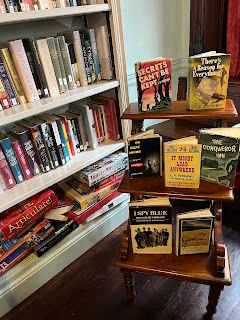
The British Crime Writing Archives are held at Gladstone's Library, in Hawarden, north Wales. This wonderful place is the home of the archives of both the Crime Writers' Association and the Detection Club. The process of developing the archives and then cataloguing them is a very long-term one, but earlier this year, new loan agreements were signed between the Library and the CWA and the Detection Club which ensures that the Library will continue to be the home (or perhaps in future, as mentioned below, the principal home) of the archives.

This is an exciting development which gives all three organisations a great deal of confidence for the future. As honorary archivist for both the CWA and the Detection Club, I'm truly delighted that the future of the archives is now more secure than ever before. There's a great deal of work still to be done, but at least sound foundations are now in place.
The above photos show a handful of books from those that have been donated to the archives. These particular donations come from various sources, including the family of E.R. Punshon (a former Secretary of the Detection Club), Peter Lovesey, the estates of Robert and Louise Barnard, and myself. Space for books of individual authors is extremely limited at present, however. Yet we are keen to preserve as many as is practicable, and if any readers of this blog know of any other suitable archives in the UK that we could collaborate with, I'd be very glad to know.
One of the highlights of my annual calendar is Alibis in the Archive, and this weekend festival will be held at Gladstone's Library from 7 to 9 June 2024. Tickets will go on sale shortly and if you're interested, do register that interest with the Library right away, since once tickets are made available, they usually go very quickly. If you can't make it in person, you can still take part online - a good option for those who are overseas in particular.
We have some wonderful speakers lined up for Alibis, including an international bestseller and the creator of a very famous TV crime series. So the weekend will be quite something. I do hope that many of you can join us - and, by so doing, support this marvellous library and the archives project.
November 27, 2023
Terry Venables R.I.P.
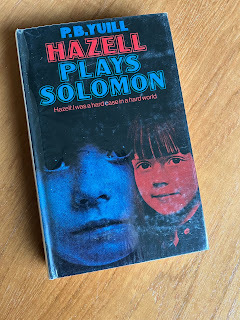
The death of Terry Venables, the former England football player and manager, has prompted many reminiscences about this talented and popular man. Naturally these have focused on his achievements in the football world, but he was a multi-faceted character, sometimes controversial (especially in his business activities) but always, it seemed to me, interesting and charismatic. Among many other things, he found time to create the very enjoyable James Hazell mysteries.
The Hazell books were written in collaboration with Gordon Williams, a writer of genuine accomplishment, who died in 2017. The pair had previously written a football novel called They Used to Play on Grass (about plastic pitches, now so commonplace!) under their own joint names.
Williams had used the pen-name P.B. Yuill for his strange stand-alone novel and for some reason the pair decided to use the same name for the three Hazell mysteries that they wrote together. The books are short, snappy reads, very much of their time. I'm glad to have a couple of them signed by both Williams and Venables.
Over the years, there haven't been many really good British private eye characters. I think Hazell was one of the most appealing. The late Bob Adey, no mean judge, ranked the books as in the same league as those by Robert B. Parker - quite an accolade. It's no great surprise that the character was taken up for television; here are my thoughts after on Talking Pictures TV.
November 24, 2023
Forgotten Book - The Echoing Stones
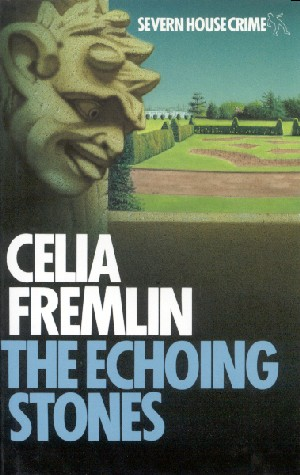
The Echoing Stones was Celia Fremlin's penultimate book, written when she was in her late 70s and published (by Severn House) in 1993. I don't think it's unfair to say that it is in some respect an older writer's novel and that may be why it seems to have been turned down by Gollancz, who had published her up to that point in her career. It's not a story that has a lot of pace or drama. But Fremlin was a very good writer and the novel is still extremely readable.
Arnold, a conventional man of sixty-one has just done something unconventional. He's given up his comfortable existence, deciding to sell up his house and take a job as caretaker and guide at a Tudor mansion. He loves history and he wants to live the dream. Unfortunately he neglects to persuade his wife Mildred of the merits of his decision. She leaves him, and as a result he's finding it difficult to look after the place by himself.
Things start to look up when his wayward daughter, Flora, arrives unexpectedly. She is willing to help serve teas to visitors, but her wilfulness is a problem, especially when she befriends the senile former curator, whose daughter is struggling to look after him. Meanwhile Mildred finds herself a new man, only to discover that he has a strong interest in the very mansion from which she fled...
The great strength of this book lies in Fremlin's flair for social comedy, a feature of some of her best novels. The scenes involving Mildred and her feminist friend Val are amusing and Fremlin's caustic observations on social mores are entertaining. The 'crime' element of the book is present, but rather perfunctory. Read it to enjoy the writing rather than to be dazzled by the mystery.
November 22, 2023
The Ones Below - 2015 film review
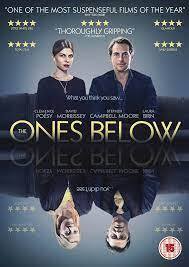
The Ones Below is a creepy British film from 2015 that deals in the anxieties common to new parents. The story is set in London and features an attractive, youngish couple, Kate and Justin (Clemence Poesy and Stephen Campbell Moore). They live in an upstairs flat and new neighbours move into the flat downstairs. This couple, Jon and Theresa, are played by the versatile and consistently impressive David Morrissey and Laura Birn.
Kate and Justin are expecting their first child and so, it turns out, are Jon and Theresa. This creates a bond between the two couples, although it's clear from the outset that there is something slightly 'off' about Jon, and in particular with his apparently obsessive desire to become a father. His relationship with Theresa seems close, but is it also controlling?
The film is written and directed by David Farr. It was his feature debut, but he is a very experienced writer. His credits include episodes of Spooks, a top-class thriller series, and also The Night Manager. This story is quite different from that type of writing, but it's very well done, in my opinion. The tension is subtly developed and efficiently maintained from start to finish.
The relationship between the two couples breaks down after a terrible incident, which is open to misinterpretation. After that, there is an apparent reconciliation, but the viewer fears the worst. And with good reason. This is a dark crime film, and has certain depressing features, but I thought it was a gripping and accomplished piece of work.
November 20, 2023
Red Herrings - guest post by Matthew Booth
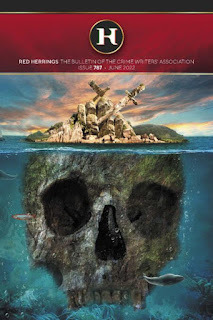
Matthew Booth is a writer and editor with a special expertise in Sherlock Holmes. His latest novel is The House of Skulls, just published by Pegasus, Elliot, McKenzie. He was also a very popular speaker at Alibis in the Archive in June of this year. He succeeded his friend and colleague David Stuart Davies as editor of Red Herrings, early copies of which are kept at the British Crime Writing Archives at Gladstone's Library. Those old newsletters are absolutely fascinating - I was reading through the 1966 issues at the Library a few days ago and came across an obit for the guy who wrote the novel that was filmed as Dr Strangelove. It turns out he was a CWA member (the author, I mean, not Dr Strangelove). Red Herrings continues to be a must-read for CWA members (see the above cover image) and I asked Matthew to talk about it:
'Red Herrings is the Crime Writers’ Association’s monthly magazine and I have been its editor for the last four years or so. I follow in a long line of esteemed writers who have held the post before me – not only big shoes to fill, but a list of names to which I am proud to be added.
Editing any magazine brings with it the constant worry that you will have no content to fill it. Fortunately, I have been lucky enough to have had a steady stream of articles, thoughts, and opinions, so that the challenge becomes which articles to use and when. I am always grateful to those CWA members who contribute, often without any prompting or press-ganging from me. Red Herrings is a magazine for the members and by the members. It can only ever be as good as its content and that content can only ever come from the members. Knowing that the members want to write for it and provide a diverse selection of articles is not only rewarding, but proves that the members enjoy the magazine and hold it in high esteem.
Putting together an issue is hard, but gratifying work. Each issue requires a decision about what articles to use and in what order. The magazine boasts a broad spectrum of content. Red Herrings covers crime writing of all types, fact and fiction. We have had articles which examine the impact of the Yorkshire Ripper killings, investigations into historical murders, such as the slaying of Thomas Arden, a crime which was later immortalized in a play by Thomas Kyd, as well as discussions and insights into how we, as authors, work and create. Red Herrings also has its own visual style. Every issue has a different cover, all related to crime writing, and each article is given relevant images to accompany it. These flourishes help to keep the magazine vibrant and exciting, and the design of the Red Herrings gets regular praise from members.
In CWA terms, Red Herrings is an institution and long may it continue to be, whether in my hands or in those of my successor. For now, I’ll continue to try to maintain the high standards of the magazine, and hope that those articles still come flooding in…'
Thanks, Matthew, and very best of luck with The House of Skulls!
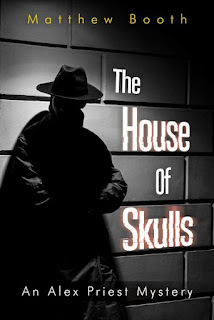
November 17, 2023
Forgotten Book - Mediterranean Murder
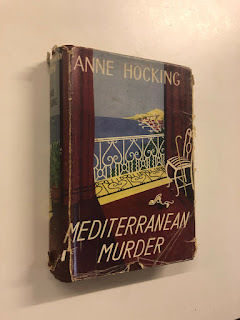
Anne Hocking (1889-1966) was a prolific crime writer who came from a talented literary family. Her father Joseph wrote many Cornish novels, while her uncle Silas (now there's a literary name with echoes of Le Fanu...) was best-known for Her Benny, a book about Liverpudlian waifs which was later successfully republished through a small press by a crime writing friend of mine, Jim Parkinson. Her sisters Joan Shill and Elizabeth Nisot were also published novelists who dabbled in crime.
I've never got round to reading Hocking until now, partly because her books don't seem easy to find. But I came across a copy of Mediterranean Murder on a pub shelf full of old books and a donation to charity was enough to make it mine, thanks to the landlord's kindness. The copy in poor condition, with a ripped spine and no jacket, but apparently it's a scarce book, so I was glad to lay my hands on it.
I'm sure that this is one of those detective novels where the author has been inspired by a trip to foreign parts to write a story with a 'different' setting. In the austere years that followed the Second World War, there was a vogue for Euro-mysteries, which John Bude among others took full advantage of. Much of the story is set either in Spain or on ship bound for Britain, so the title is slightly misleading, but no matter. It's another case for Hocking's usual sleuth, DCI William Austen - a Scotland Yard man with his own manservant!
Austen is persuaded by his mate Crosby to go on a restorative trip abroad, but when they encounter a family called the Benthams, mysterious events begin to occur. Wealthy Mary Bentham has a suspicious accident, and then a fatal fall downstairs, and her hypochondriac son Donald suspects foul play. What follows is a conventional story, but it's written competently. Hocking was a second-tier crime writer, but I'd be happy to read more of her books.
November 15, 2023
Bodies from the Library 6, edited by Tony Medawar
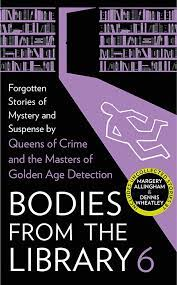
The Bodies from the Library series of anthologies has resurrected a large number of obscure vintage mysteries, including a number of radio plays. It's a tribute to the research skills of editor Tony Medawar that even though this is his sixth collection, there is only one story in this book that I can recall reading before, namely E.C. Bentley's 'Greedy Night'.
One great find is a very early short story by Cyril Hare. 'The Blackmailers' was first published in 1929, years before Hare's first novel appeared, but it displays his characteristic irony and smoothly readable writing style, as well as benefiting from his legal know-how. I really was pleased to discover this one.
My other favourites were quite different. Alice Campbell's 'No Evidence' is an obscure tale from 1930 and a good read. Christianna Brand's 'A Piece of Cake' dates from 1983, so it's by no means a Golden Age story in any meaningful sense, but it's rather nicely done.'The Glass Gravestone' by the under-estimated American writer Joseph Commings is also enjoyable.
The book includes stories by such well-known writers as Margery Allingham, George Bellairs, Andrew Garve, and Anthony Gilbert. Another story I've never even heard of, let alone read, is actually a round-robin novella, 'Sinister Sequence'. This is a pulpy thriller of interest mainly as an illustration of the different writing styles and techniques of authors such as Michael Cronin and Geoffrey Household. One of the other contributors to the novella was L.P. Hartley, a terrific writer, and his involvement in the enterprise is perhaps the biggest surprise in the book. What isn't a surprise is that Tony Medawar's notes are consistently informative.
November 13, 2023
The last live events of 2023

I've been involved in some wonderful crime writing events throughout 2023 and my last two 'live' events of the year were certainly very enjoyable. The first of these was an interview (by Matt Dolman) at Bromley House Library (above) in the delightfully named Angel Row in the heart of Nottingham. I'm fascinated by private libraries such as Gladstone's Library and the Lit and Phil in Newcastle and Bromley House also has a fantastic atmosphere. I visited it a few years ago when someone showed me round and I was delighted to return on this occasion. The interview was very well attended and there was also an online component, which was nice.

On Saturday, I was the guest of the PBFA (Provincial Booksellers' Fairs Association) as the wonderful Detective Fiction fair at Harrogate's Yorkshire Pavilions (the above photo), which is held every two years. I've visited this particular fair on many occasions, so it was a special treat to be invited as a guest by Louise Harrison and Jeremiah Vokes. What I really didn't expect was to be so busy all day - so much so that I hardly got a chance to study the offerings at the various stalls.
I had many fascinating conversations, with old friends as well as with new acquaintances with, pleasingly, a very wide age range. It was a particular treat to meet Terry Hale and his wife. Great French Detective Stories, an anthology edited by T. J. Hale, was published forty years ago and I've long admired it. Terry is now fascinated by Japanese crime films and he gave me a lot of info about these that I look forward to following up.
Book fairs and the book world fascinate me. I very much enjoyed setting The Traitor in that world and I've been working on another literary project in this area of late. What will come of it, who knows? But Saturday was a marvellous day that will linger in my memory, as will so many pleasant moments from the past twelve months at places as diverse as San Diego and Shetland.



